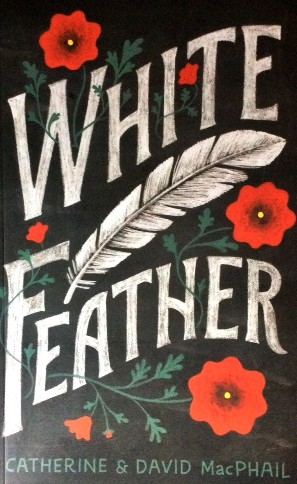Inspiring Young Readers
 posted on 04 Nov 2018
posted on 04 Nov 2018
White Feather by Catherine and David McPhail
This year’s World War One Armistice centenary commemoration has produced a flurry of excellent children’s books with a related theme and they provide a poignant way of conveying the horror, bravery and grief that was suffered by so many individuals. This novella is possibly the only one that includes the experience of a family whose life was changed forever because a sixteen year old soldier, Charlie, was executed for ‘cowardice’ in no-man’s-land.
The war is over when the story begins but celebrations have little meaning for Charie's mother and younger brother, Tony, who continue to be jeered at and punished by their community - and Tony is not surprised when he is given a white feather as the well-known symbol of cowardice.
I’m not sure how many people were affected by having a loved one executed in the way Charlie was but it doesn’t take much imagination to conjure up the circumstances where running from relentless gunfire might seem to be the only sensible option for survival. However, military discipline was unforgiving and un-nuanced - if a soldier was reported for desertion, then the consequences were always swift; to be shot at dawn. This kind of summary execution was used as a deterrent - the calculation being that it is better to frighten the rest of the troops with the threat of certain death than risk any copycat cowardly behaviour.
Despite this knowledge and the bitter shame that he feels, Tony just cannot accept that Charlie would run away from battle and desert his comrades. Their mother is unhinged with grief and seems to believe that he will soon return safely. When an ex-friend of Charlie’s turns up at the door with a brown paper parcel containing his remaining possessions, Tony asks him some questions and learns that he had refused a blindfold when he faced the firing squad . He finds out a bit more about what the ghastly conditions were like and the overall sense of panic and confusion. He was apparently seen and reported for deserting his post by one officer, Lieutenant Fortune.
Later, Tony finds an odd letter amongst his brother’s things and decides that the unusual use of formal language, including the word ‘fortune’ must be a clue to what had really happened. And so he begins a long and difficult quest to find the truth by tracking down Lieutenant Fortune to get his version of events.
I am not going to spoil the plot of this unusual story but suffice it to say that it manages to include information about post-traumatic stress disorders suffered by individuals and families from all backgrounds. When Tony finally confronts Fortune, he discovers that, although soldiers from the lower ranks have less power than the officer class, the consequences of cowardice are lifelong guilt and despair, no matter what one’s background.
I found this to be a moving story that conveyed the raw grief of losing a brother very powerfully. As ever, with Barrington Stoke publications, the plot moves quickly and the characters are well drawn from the outset to keep the interest of reluctant readers. I hope that this angle on WW1 by the award winning mother and son authors, Catherine and David McPhail, will be used by teachers in order to make sure that children can have an insight into what we mean by ‘ an honourable death’ and to challenge notions of what terms like heroism and cowardice mean against the background chaos of war.
Karen Argent
November 2018